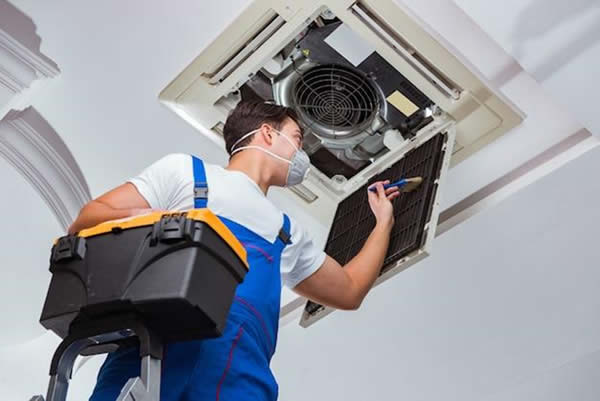It’s mid-summer, and you’re sweating in your home. You turn on the AC unit to cool off, but instead of that refreshing blast of cold air, you get an error indicating that your AC unit isn’t working.

It’s frustrating, but it happens to everyone—especially if you’ve had your AC unit for years. There are a few things that can break on a central air conditioning system, and when they do, it’s important to know how to fix them so you can get back to enjoying your home sooner rather than later. In this blog post, we’ll give you the scoop on what typically breaks on an AC unit and why it happens so that you can ensure yours lasts!
1. Tripped AC Unit Circuit Breaker
The circuit breaker is a safety device that will trip if it senses too much current flowing through the wires. You can reset it by flipping it back to “on,” but it’s best to avoid tripping your circuit breakers in the first place! Call an electrician immediately if you notice any issues with your AC unit.
2. Evaporator Coil Issues
Evaporator coils are made of copper, which can be damaged by corrosion. If they are dirty or corroded, it is important to replace them before any damage occurs. They have moving parts like fans and motors that could break down if improperly maintained.
3. Dirty HVAC Filter Or Air Filter
A dirty HVAC filter is one of the most common causes of an AC unit not cooling properly, so it’s important to make sure you’re changing your filters regularly.
The frequency with which you need to change your air filter depends on a few factors:
- The type of filter (there are many different types)
- The size of your system and how much dust is in the area where it’s located (if your system is in an area with lots of dust, like near construction sites or farms)
4. Thermostat Malfunction
The thermostat is the brain of an HVAC system, so it needs to be working properly. If it malfunctions or breaks down, it may be difficult to get cool air out of the vents, making it difficult to stay comfortable in warm weather. Don’t delay replacing it, as a malfunctioning or broken-down thermostat can cause serious problems with how well the system functions and how much money its owner spends on repairs. Knowing what parts need fixing should always come before any other steps are taken.
5. Refrigerant Leaks
A refrigerant leak can cause problems with your AC unit, including:
- Increased energy usage
- Reduced performance
- Unreliability.
To check for leaks, look for an oily substance outside your condenser unit or any other system part (such as pipes). If there is no leak, this could mean problems elsewhere in your system, causing pressure to build up within it. In this case, you should call a technician with experience repairing air conditioners and refrigeration units. If you find evidence of a leak but don’t have tools available to fix it yourself–or if you don’t want to deal with fixing things yourself–call an expert immediately!
6. Bad Capacitor
A capacitor is a device that stores and releases electrical energy. It’s used in heating and cooling systems to store electricity but can also fail, causing your AC unit to stop working. If your compressor isn’t turning on as frequently or at all, check the capacitors before calling for service.
If your capacitor has failed and needs replacing, contact us today! We’ll have someone out there within 24 hours to fix the issue for you quickly and efficiently.
7. Clogged Drainage Line
The drainage line is part of an air conditioner carrying water from the unit to a drain or sewer. There is a clog along the line if standing water is in it. If you don’t have time to clean out any blockages yourself, call an HVAC professional for help. They will be able to diagnose problems quickly and efficiently and know how much time needs to be spent cleaning out debris before repairs can begin.
Schedule Your AC Unit Service
This post has helped you understand what typically breaks on an AC unit. As you can see, many things can go wrong with your HVAC system, but the good news is that most of them are easy to fix! If you’re looking for a professional to diagnose problems with your heating and cooling system, contact us today.


